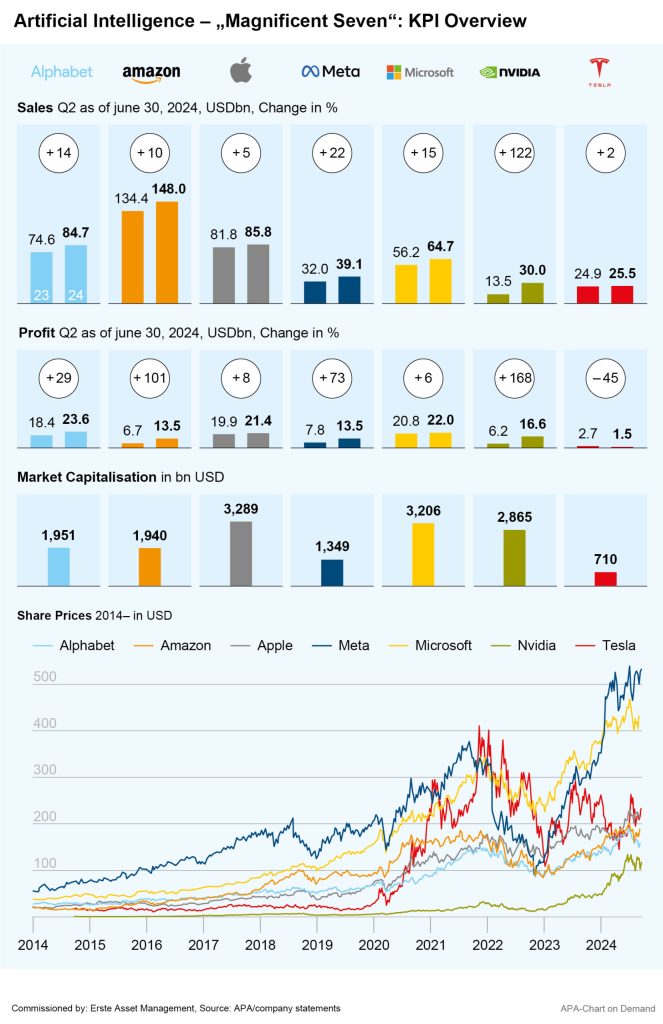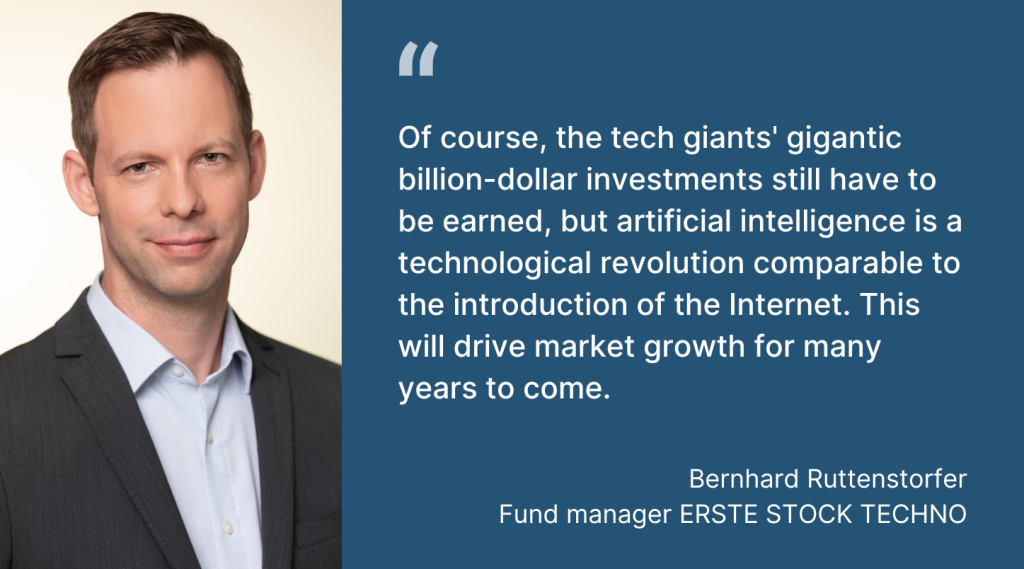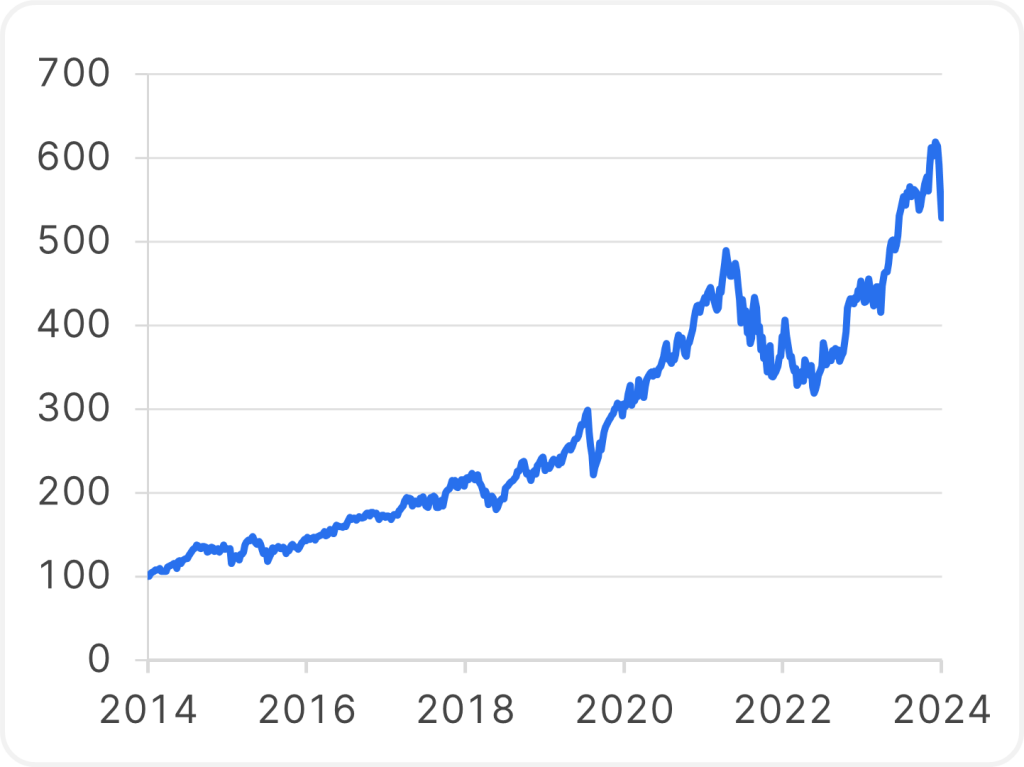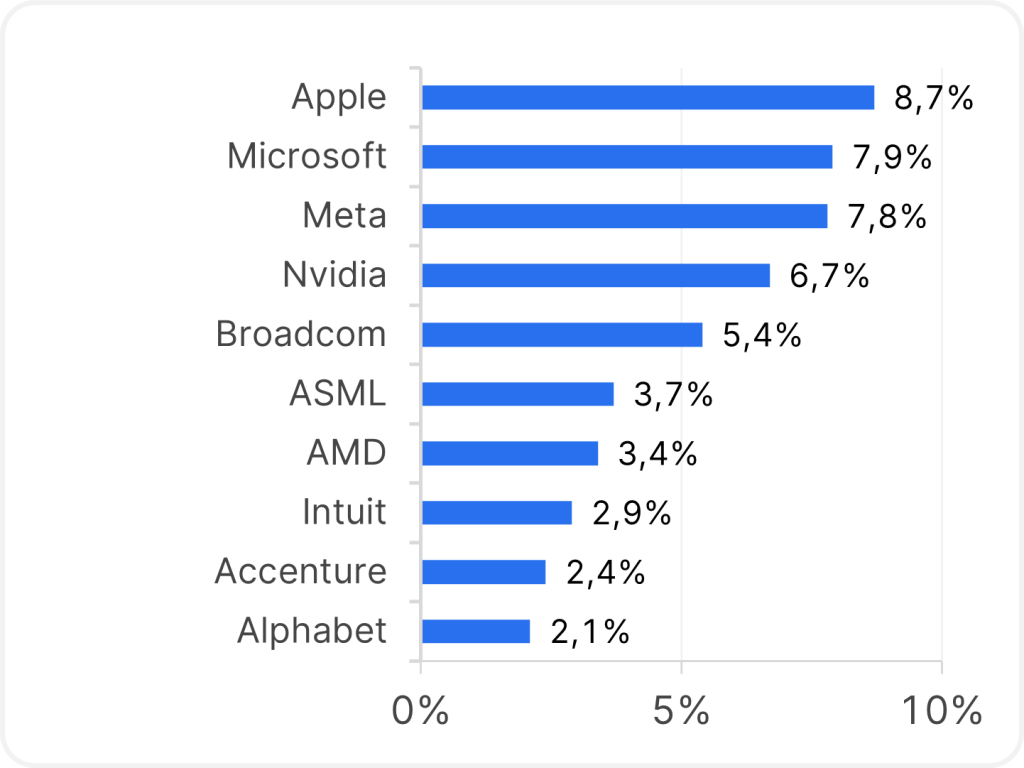
On the US stock markets, the price rally fuelled by the Artificial Intelligence (AI) boom has recently run out of steam. The quarterly figures reported by the major technology companies in the summer received mixed reactions, with some of the tech giants’ shares recently facing a correction as investors are increasingly questioning whether the AI trend will also translate into profitable business models. Training AI models and operating them in huge data centres costs billions and it is still unclear to what extent the business is profitable.
While AI pioneer OpenAI is constantly reporting record user numbers, the number of paying ChatGTP users has so far been relatively low, and in response, the company now plans to boost its business with paid subscriptions. OpenAI recently broke the one-million-paying-user mark – which is a rapid increase, as, in April, only 600,000 paying customers were registered. However, there are still over 200 million users of the free version of the generative AI ChatGTP.
OpenAI Plans to Raise Further Billions
OpenAI also needs further massive injections of capital to expand its services. The ChatGPT developer apparently wants to raise USD 6.5bn of fresh money from investors. The company intends achieve a valuation of 150 billion dollars, the Bloomberg news agency recently reported, citing informed sources. According to media reports, Apple and AI chip manufacturer Nvidia plan to contribute to the cash injection. Software giant Microsoft, which already invested around USD 10bn dollars in the ChatGPT developer, would also provide additional capital, according to the Wall Street Journal. The companies listed here have been selected as examples and do not constitute an investment recommendation.
However, competition for OpenAI is now entering the market. AI company Anthropic, which is supported by Amazon and Google among others, now also offers its competitor Claude as part of a corporate subscription. Amazon also wants to use Anthropic AI for the planned revision of its digital assistant Alexa. The US online retailer has turned to Claude because an in-house development was not technically convincing, people familiar with the matter told the news agency Reuters.
Companies Increasingly Using AI for Customer Enquiries
Many investors are also hoping for further success stories around company-wide use of AI applications. Positive news came this year from financial services provider Klarna. Thanks to the use of AI to process customer enquiries, Klarna has recently been able to achieve massive job savings. “About twelve months ago, we had around 5,000 jobs, now there are only around 3,800,” said CEO Sebastian Siemiatkowski in an interview with the news agency Reuters. However, the job cuts have been achieved almost exclusively through natural fluctuation. In the longer term, the workforce is expected to shrink to 2,000 people.
Vodafone is also investing around EUR 140m in AI systems from Microsoft and OpenAI this year. They hope to improve customer enquiry response. At the fast food chain Taco Bell, AI will also take orders at the car counter instead of people in the future. The technology will be installed at several hundred US locations by the end of the year, the operating company Yum Brands announced.
AI Demand Brings Rapid Growth for Cloud Services, but Also Massive Investments
The main beneficiaries so far have been the providers of the infrastructure required for AI and, in particular, cloud service providers. Thanks to its strong cloud division, Oracle recently reported surprisingly strong quarterly figures. The group revenue rose up 8 per cent to USD 13.3bn at the start of the 2024/2025 financial year. Of this, USD 5.6bn was attributable to the cloud business, which saw a 22 per cent growth.
However, cloud service providers are also increasingly under pressure to justify their large investments to investors. Amazon reported an increase in turnover of almost 20 percent to USD 26.3bn for its cloud division Amazon Web Services (AWS) for Q2, surpassing market expectations. At the same time, the company announced that it had invested a total of USD 30.5bn in the first half of the year. This includes expenditure on the AWS data centres. In view of the high demand for AI applications, the group intends to invest even more in the latter half of the year.

Nvidia Shares Recently Under Pressure Despite Record Figures
The quarterly figures reported by semiconductor company Nvidia, which specialises in AI chips, were also received poorly on the stock market despite the unbroken boom. From the start of the year until its record high in June, Nvidia’s share price almost tripled in 2024 alone. In September, however, the share price underwent a strong intermittent correction. On 3 September alone, the share price fell by 9.5 per cent. This caused Nvidia’s market capitalisation to plummet by USD 279bn. Never before has a US company lost so much market value in one day. The share price has since recovered, but it remains below its record high.
Nvidia is one of the main beneficiaries of the AI boom. The company’s chips, originally developed as graphics card processors, are particularly suitable for AI applications. They have established themselves as the leading hardware for training AI software in data centres. This has brought Nvidia explosive growth in turnover, profit and share price. In addition to the chips, the company also earns money from software. Nvidia is therefore regarded as the proverbial shovel manufacturer benefiting most from the gold rush.
In Q2, Nvidia increased its turnover from USD 13.5bn in the previous year to nearly USD 30bn. This is an increase of 122 per cent. This follows on from the previous three months, in which revenue increased by 262 per cent. Nvidia’s quarterly profit rose from just over USD 6.2bn to almost 16.6bn in a year-on-year comparison. For the current quarter, the group expects a further increase in turnover to USD 32.5bn, slightly exceeding analysts’ forecasts.
However, investors are concerned that the next generation of Nvidia chips by the name of Blackwell still needs some reworking. In addition, its dominance in AI chips has put the company in the sights of American competition regulators, according to informed parties. The US Department of Justice has issued legally binding requests for information from Nvidia and other companies, Bloomberg reported. The anti-trust watchdogs are concerned, among other things, that Nvidia could hinder customers from switching to the competition, according to sources close to the matter.
In addition, Nvidia’s success is also attracting more and more potential competitors. Huawei, for example, wants to compete with the global market leader with a new generation of specialised processors. According to a report in the Wall Street Journal, the Chinese company’s Ascend 910C chip is about to be launched on the market following tests at internet and telecoms companies.
AI boom influences shares in ERSTE STOCK TECHNO
The stocks held in the ERSTE STOCK TECHNO technology equity fund are benefiting from the ongoing AI boom. The European fund platform CAPinside currently lists the fund among the ten best-managed technology equity funds worldwide. Fund manager Bernhard Ruttenstorfer focuses primarily on semiconductor stocks, which are currently heavily weighted at 29%. He sees corrections like the one that occurred in August as a correction in the upward trend and an opportunity for purchases at a cheaper price level. “Demand in the semiconductor industry is broadening and the software industry is stabilizing. Of course, the tech giants’ gigantic billion-dollar investments still have to be earned, but artificial intelligence is a technological revolution comparable to the introduction of the Internet. This will drive market growth for many years to come.”
Erste AM tech expert sees the companies as fundamentally well supported. He bases his optimism on the good demand for machines for the semiconductor industry, broadening demand and supply for AI applications and a stabilizing software industry. Cybersecurity, autonomous driving and the Internet of Things are also long-term topics that have a positive impact on the tech sector. In 2024, companies should be able to achieve an average profit growth of 10-15%. Next year this could rise to 20%, says Ruttenstorfer.
Risks and opportunities at a glance
Advantages for the investor
- Broad diversification in technology companies with little capital investment.
- Active stock selection based on fundamental criteria.
- Opportunities for attractive capital appreciation.
- The fund is suitable as an addition to an existing equity portfolio and is intended for long-term capital appreciation.
Risks to be considered
- The price of the funds can fluctuate considerably (high volatility).
- Due to the investment in foreign currencies, the net asset value in Euro can fluctuate due to changes in the exchange rate.
- Capital loss is possible.
- Risks that may be significant for the fund are in particular: credit and counterparty risk, liquidity risk, custody risk, derivative risk and operational risk. Comprehensive information on the risks of the fund can be found in the prospectus or the information for investors pursuant to § 21 AIFMG, section II, “Risk information”.

Money tip: Investing in future technologies
You can invest in promising future technologies such as AI and cybersecurity with ERSTE STOCK TECHNO. The equity fund’s portfolio includes well-known tech stocks such as Nvidia, Microsoft, Meta and Apple.
Note: Please note that an investment in securities involves risks as well as opportunities. The companies listed here have been selected as examples and do not constitute an investment recommendation. The portfolio positions listed may change at any time as part of active management. There is no guarantee that securities will be permanently included in the portfolio. Past performance is not a reliable indicator of future performance.
How has the fund performed?
Development over the past 10 years

What’s inside?
Top 10 Positions of the funds

Note: Chart is indexed (6.8.2014 = 100). The performance is calculated in accordance with the OeKB method. The management fee as well as any performance-related remuneration is already included. The issue premium which might be applicable on purchase and as well as any individual transaction specific costs or ongoing costs that reduce earnings (e.g. account- and deposit fees) have not been taken into account in this presentation. The following information is provided by the manufacturer (Erste Asset Management GmbH), information of the respective sales partners may differ.
Notes ERSTE STOCK TECHNO
The fund employs an active investment policy and is not oriented towards a benchmark. The assets are selected on a discretionary basis and the scope of discretion of the management company is not limited. Please note that investing in securities also involves risks besides the opportunities described.
For further information on the sustainable focus of ERSTE STOCK TECHNO as well as on the disclosures in accordance with the Disclosure Regulation (Regulation (EU) 2019/2088) and the Taxonomy Regulation (Regulation (EU) 2020/852), please refer to the current Prospectus, section 12 and the Annex “Sustainability Principles”. In deciding to invest in ERSTE STOCK TECHNO, consideration should be given to any characteristics or objectives of the ERSTE STOCK TECHNO as described in the Fund Documents.
Legal note:
Prognoses are no reliable indicator for future performance.
For a glossary of technical terms, please visit this link: Fund Glossary | Erste Asset Management
Legal disclaimer
This document is an advertisement. Unless indicated otherwise, source: Erste Asset Management GmbH. The language of communication of the sales offices is German and the languages of communication of the Management Company also include English.
The prospectus for UCITS funds (including any amendments) is prepared and published in accordance with the provisions of the InvFG 2011 as amended. Information for Investors pursuant to § 21 AIFMG is prepared for the alternative investment funds (AIF) administered by Erste Asset Management GmbH pursuant to the provisions of the AIFMG in conjunction with the InvFG 2011.
The currently valid versions of the prospectus, the Information for Investors pursuant to § 21 AIFMG, and the key information document can be found on the website www.erste-am.com under “Mandatory publications” and can be obtained free of charge by interested investors at the offices of the Management Company and at the offices of the depositary bank. The exact date of the most recent publication of the prospectus, the languages in which the fund prospectus or the Information for Investors pursuant to Art 21 AIFMG and the key information document are available, and any other locations where the documents can be obtained are indicated on the website www.erste-am.com. A summary of the investor rights is available in German and English on the website www.erste-am.com/investor-rights and can also be obtained from the Management Company.
The Management Company can decide to suspend the provisions it has taken for the sale of unit certificates in other countries in accordance with the regulatory requirements.
Note: You are about to purchase a product that may be difficult to understand. We recommend that you read the indicated fund documents before making an investment decision. In addition to the locations listed above, you can obtain these documents free of charge at the offices of the referring Sparkassen bank and the offices of Erste Bank der oesterreichischen Sparkassen AG. You can also access these documents electronically at www.erste-am.com.
Our analyses and conclusions are general in nature and do not take into account the individual characteristics of our investors in terms of earnings, taxation, experience and knowledge, investment objective, financial position, capacity for loss, and risk tolerance. Past performance is not a reliable indicator of the future performance of a fund.
Please note: Investments in securities entail risks in addition to the opportunities presented here. The value of units and their earnings can rise and fall. Changes in exchange rates can also have a positive or negative effect on the value of an investment. For this reason, you may receive less than your originally invested amount when you redeem your units. Persons who are interested in purchasing units in investment funds are advised to read the current fund prospectus(es) and the Information for Investors pursuant to § 21 AIFMG, especially the risk notices they contain, before making an investment decision. If the fund currency is different than the investor’s home currency, changes in the relevant exchange rate can positively or negatively influence the value of the investment and the amount of the costs associated with the fund in the home currency.
We are not permitted to directly or indirectly offer, sell, transfer, or deliver this financial product to natural or legal persons whose place of residence or domicile is located in a country where this is legally prohibited. In this case, we may not provide any product information, either.
Please consult the corresponding information in the fund prospectus and the Information for Investors pursuant to § 21 AIFMG for restrictions on the sale of the fund to American or Russian citizens.
It is expressly noted that this communication does not provide any investment recommendations, but only expresses our current market assessment. Thus, this communication is not a substitute for investment advice.
This document does not represent a sales activity of the Management Company and therefore may not be construed as an offer for the purchase or sale of financial or investment instruments.
Erste Asset Management GmbH is affiliated with the Erste Bank and austrian Sparkassen banks.
Please also read the “Information about us and our securities services” published by your bank.



